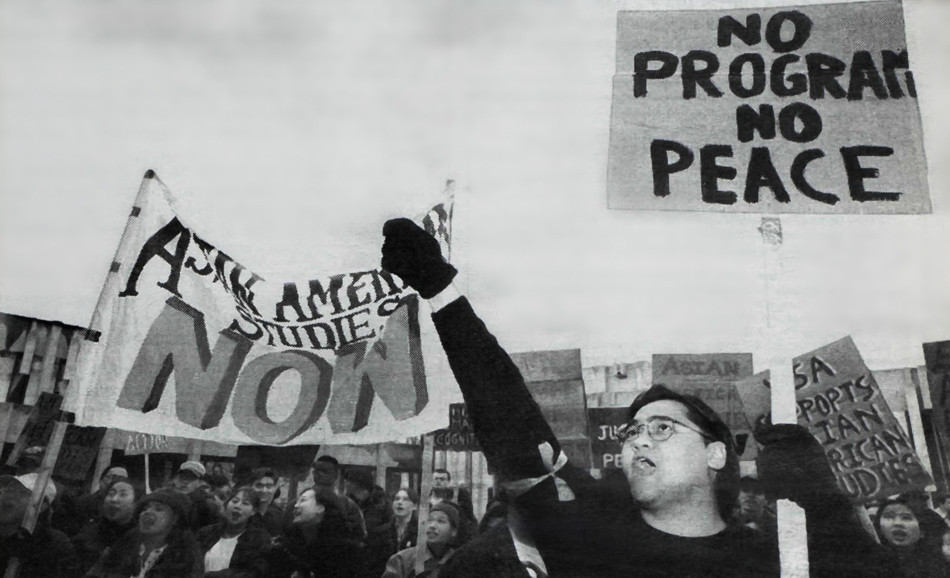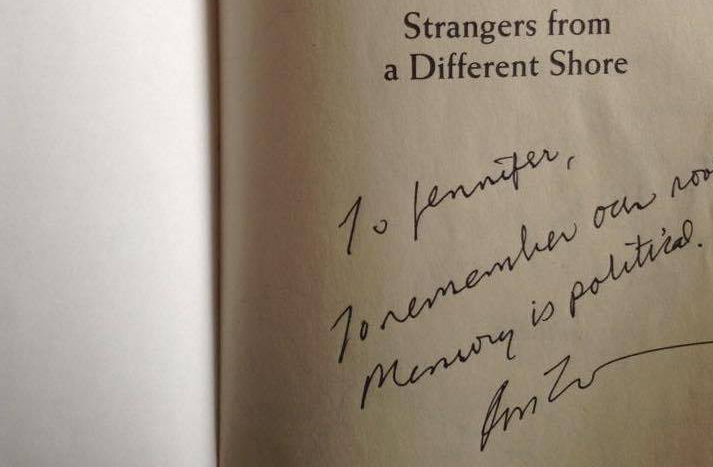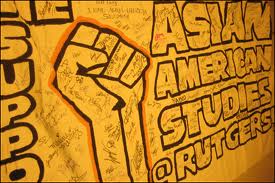
I would not be who I am without Asian American Studies. This blog would not exist without Cornell’s Asian American Studies Program.
I can trace my genesis as an Asian American activist, writer, and intersectional feminist to one class: Introduction to Asian American History, a class I took in 2002 and which was being taught for the first time by the newly-recruited Professor Derek Chang.
By the time I enrolled for Professor Chang’s history class, I had already become politically aware as an Asian American. I was already a member of Asian Pacific Americans for Action, our school’s on-campus Asian American political student group. I was already aware of anti-Asian racism and gendered violence, and angry as heck about it.
What I lacked was a researched foundation for that anger, a considered self-awareness of our intersections, or a broader context within which I might situate my identity as a contemporary Asian American woman. These are the things that Professor Chang’s class in Asian American History (and later, Introduction to Asian American Studies) gave to me; and, these are all things that continue to inform my writing and activism today.

I remember walking into a 200-seat auditorium and being humbled that the room was filled to capacity with expectant Asian American students. An exceptionally young-looking, bespectacled, Chinese American man stood at the front of the classroom. He held up a book – “Strangers From a Different Shore” by Ron Takaki – and invited us to join him in a journey into our collective past. Over the course of that semester enrolled in my first-ever Asian American Studies class, I was overwhelmed by the breadth of knowledge I was exposed to, and that had been completely overlooked in other classrooms. I was struck by the richness of our history, and humbled by my membership within the larger legacy of the AAPI Movement.
More importantly, I learned to consider the Asian American, Native Hawaiian & Pacific Islander identity more broadly, beyond my own personal narrative as a heterosexual, cis-gendered, well-educated Chinese American woman. I developed a diasporic and archipelagic appreciation of the pan-ethnic AAPI community that recognized the similarities shared by those within our coalitional identity while still celebrating our interethnic differences. I built an intersectional politic that positioned my identity within a larger nexus of race, gender, class and sexuality. In a September profile with the Cornell Daily Sun, Chang said of Cornell’s Asian American Studies Program:
This space becomes a kind of safe space for students. Our courses become a kind of place where students can sit and think and talk about questions that affect them that they cannot get elsewhere on campus.
This is exactly what Asian American Studies at Cornell was for me, and it is the kind of formative “safe space” for living and learning that all AANHPI youth deserve.
I emerged from Professor Chang’s class with two commitments: 1) to minor in Asian American Studies (which I carried through on); and 2) to build an online space that would foster more formal and informal scholarship about our history and our identity for AANHPI youth. After Professor Chang’s class, Reappropriate evolved into the widely-read Asian American feminism blog it is today, and it will be celebrating its 14th anniversary this year.
So, it’s with sadness that I consider the current state of Asian American Studies Programs at the nation’s colleges and universities.
Cornell’s Asian American Studies Program was founded in 1987 as the first of its kind at an Ivy League university. Throughout the 1970’s and 1980’s (and into the present day), students have participated in an unrelenting movement to institute Asian American Studies Programs at most of the nation’s colleges and universities. We staged mass protests, teach-ins and walkouts. We underscored the necessity — and the value — of an academic program devoted to our history and identity.
Yet, most school administrators remain unswayed by these efforts. Half a century after the emergence of Asian American Studies, less than fifty of the nation’s nearly 5,000 degree-granting colleges and universities offer students the ability pursue a major from a stand-alone Asian American Studies Program.
Of the Ivy League universities — many of which boast an Asian American student population of 20% or more — Cornell has been joined only by the University of Pennsylvania in creation of an independent Asian American Studies Program. Brown, Columbia and Harvard each have a multidisciplinary ethnic studies program which includes a smattering of classes on Asian American Studies. At Dartmouth, Princeton and Yale, no Asian American Studies Program currently exists.
Over the last several years, there has been a resurgent outcry from students and faculty at these and other American schools to create Asian American Studies Programs, but so far those demands have been ignored or dismissed by university administration. At Wesleyan, university president Michael Roth met with AAPI student activists working to demand creation of Asian American Studies and said to them, “ethnic studies is a dying field of study“.
(Those students were so desperate for a higher education in Asian American issues that they later created and peer taught their own after-hours lecture series. As commendable as this is, no student should find the course offerings at their institution so inadequate that they resort to having to organize their own extracurricular class.)
If ethnic studies is dying, this occurs only because university leadership starves them of resources and students.
Earlier last month this week, faculty at (corrected) alumni of the University of Michigan wrote a candid open letter documenting the slow demise of one of the country’s oldest Asian American programs. Highlighting a lack of funding, a 75-80% cut in class offerings, a secret demotion in the program’s on-campus status, and almost complete exclusion of AAPI faculty and students from the program’s activities, they write:
It has become evident that the people put in charge of running the College of Literature, Science and the Arts (LSA) and the Department of American Culture (AC) have no commitment to preserving what we all built—let alone providing the kind of expansion that we all know is needed. A/PIA Studies has no dedicated staff or office space, and it needs more classes, more faculty, and a real budget.
The result is that A/PIA Studies is nearly defunct. We need to make this as clear as can be: the organizing of A/PIA Studies programs or events has nearly ceased for three semesters running.
What is now at stake is the permanent loss of what all of us have created.
Let’s recap: cries for the creation of Asian American Studies at many of the nation’s top institutions of higher learning are dismissed, while the leadership of at least one other school appears to be doing everything in its power to destroy one of our community’s oldest Asian American Studies Program.

Make no mistake: these are our programs. Where they exist, Asian American Studies Programs have been won only by the sweat of Asian American student activists who came before us. Where these programs have been able to serve students, they laid the essential political and academic groundwork for the activism of many of today’s AAPI advocates and intellectuals. The creation of Asian American Studies Programs remains among our community’s political triumphs and enduring struggles.
(And indeed, we could be doing a lot more to integrate scholarship focused on Southeast Asian American, Native Hawaiian and Pacific Islander Studies into existing Asian American Studies Programs).
Yet, somewhere along the way, some among us became complacent. We took our collective eye off the ball, and left our Asian American Studies Programs to languish.
Fellow activists: it’s time to step the fuck up for Asian American Studies.
We need to get angry; or, if we’re already angry, we need to get angrier. We need to get out our giant Sharpies and our cardboard signs. We need to chant and protest and disrupt and agitate. We need to demand meetings with campus administrators. We need to write open letters. We need to stage walk-ins and walk-outs. We need to create hashtags and selfie campaigns and tweet the fuck out of this issue. As students, faculty, and alumni, we need to speak up about why and how Asian American Studies has mattered to us. As alumni, we need to donate. (Cornell alum, also consider donating to the A3C, our on-campus Asian American community center).
As faculty, we need to consider cross-listing relevant courses with Asian American Studies. As students, we need to enroll in AAPI Studies classes en masse if they are offered.
We need to send the message — and we need to send it as loud and clear as possible — that we will not stand for the demise of Asian American Studies at the University of Michigan or at any other school. We need instead to renew our demands that Asian American Studies Programs — and all ethnic studies programs — be widely accessible to our nation’s college students.
Yuri Kochiyama once said:
Unless we know ourselves and our history, and other people and their history, there is really no way that we can really have [the] positive kind of interaction where there is real understanding.
It was through Cornell’s Asian American Studies Program that I first learned our history, and in so doing developed a more real and nuanced understanding of our people and ourselves. The same is true for so many other students who have already been touched by Asian American Studies in this country. We must protect the rights of our children to have access to this same “safe space” of knowledge, awareness, community, and understanding.
A more socially just future cannot happen without a broad and continuing education in the injustices of our past.
(Oh, and Professor Chang, if you ever read this: thank you for teaching the class that changed my life.)
Updated (11/5/2015): Added a few extra things we should be doing as faculty and students.
